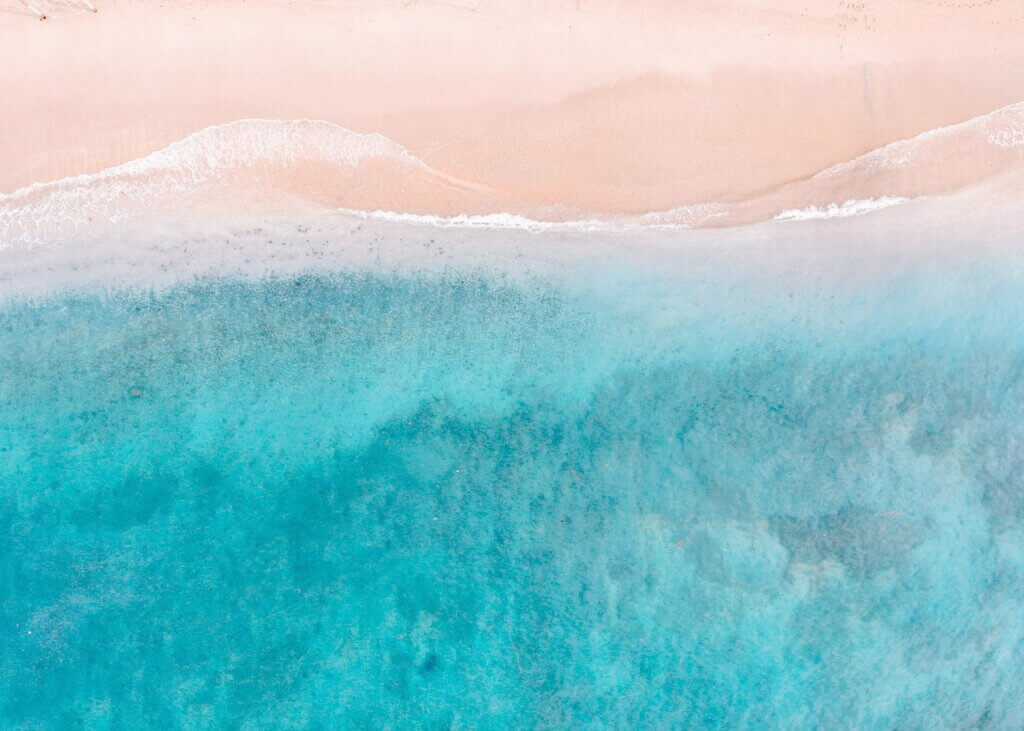Whitehaven Beach, located on Whitsunday Island in Australia’s Great Barrier Reef, is renowned for its pristine beauty and turquoise waters.
Stretching over 7 kilometers, its pure white silica sand glistens under the sun, creating a stunning contrast against the vibrant hues of the ocean. Accessible only by boat or seaplane, the beach offers a secluded paradise for visitors seeking natural tranquility and breathtaking scenery.
Surrounded by lush greenery and crystal-clear waters, Whitehaven Beach stands as a testament to the untouched splendor of Australia’s coastal landscapes.
People love Whitehaven Beach for its stunning natural beauty, crystal-clear waters, and pristine white silica sand. The beach’s unique combination of turquoise waters and pure, soft sand provides a peaceful and serene atmosphere, perfect for relaxation and reflection.
Additionally, its location within the Great Barrier Reef offers unparalleled opportunities for snorkeling, swimming, and exploring the vibrant marine life. Visitors are drawn to the untouched, idyllic setting, making it a favorite destination for nature lovers, photographers, and anyone seeking a peaceful escape in a stunning natural environment.
OUTDOOR ENTHUSIASTS AND ADVENTURERS ARE DRAWN TO WHITEHAVEN BEACH FOR SEVERAL REASONS:
Pristine Natural Beauty: The beach’s stunning white silica sand and turquoise waters provide a picture-perfect landscape ideal for photography and exploration.
Seclusion and Tranquility: With limited access by boat or seaplane, Whitehaven Beach offers a peaceful escape from the crowds, allowing visitors to fully immerse themselves in nature.
Water Activities: The clear, calm waters are perfect for activities such as snorkeling, swimming, kayaking, and paddleboarding, offering a close-up view of the vibrant marine life in the Great Barrier Reef.
Adventure Opportunities: The surrounding Whitsunday Islands provide opportunities for hiking, wildlife spotting, and other outdoor activities, enhancing the adventure experience.
Eco-Friendly Experience: Being part of a protected area, Whitehaven Beach promotes sustainable tourism, allowing adventurers to connect with nature while preserving its beauty for future generations.
WHITEHAVEN BEACH OFFERS LIMITED PARKING AND AMENITIES, CONTRIBUTING TO ITS NATURAL AND UNTOUCHED APPEAL. THERE IS NO DIRECT ROAD ACCESS TO THE BEACH, SO VISITORS TYPICALLY ARRIVE BY BOAT, SEAPLANE, OR GUIDED TOUR.
PARKING:
Boat or Seaplane Arrival: Most visitors park their boats at nearby marinas or take seaplane flights to reach Whitehaven Beach, as the beach itself does not have traditional parking facilities.
Tours and Transfers: Guided tours or boat transfers often include transportation, ensuring a seamless visit.
AMENITIES:
Limited Facilities: Whitehaven Beach is relatively undeveloped, with minimal infrastructure. There are no permanent restaurants, shops, or extensive amenities.
Toilets and Basic Facilities: Some guided tours or organized visits may provide access to basic facilities like toilets and picnic areas.
Natural Environment: This keeps the beach in its pristine, natural state, providing visitors with an authentic outdoor experience.
Overall, Whitehaven Beach is designed to offer a more immersive, eco-friendly experience with minimal disruption to its natural surroundings.
Whitehaven Beach is not pet-friendly. The beach is part of a protected national park within the Whitsundays and Great Barrier Reef, and pets are not permitted on the beach or surrounding areas. This is to help preserve the natural environment and maintain the health of wildlife and marine ecosystems. Visitors are encouraged to enjoy the beach without pets to ensure its protection for future generations.
FISHING AND CAMPING ARE NOT ALLOWED AT WHITEHAVEN BEACH, AS IT IS PART OF THE PROTECTED WHITSUNDAY ISLANDS NATIONAL PARK.
FISHING:
Prohibited: Fishing is not permitted at Whitehaven Beach to protect marine life and the surrounding ecosystem.
CAMPING:
No Camping: There are no designated camping sites at Whitehaven Beach. The beach’s natural beauty is preserved by restricting overnight stays and camping.
Visitors are encouraged to enjoy the beach’s natural surroundings during the day while minimizing impact on its delicate ecosystem.
ALCOHOL:
Alcohol is prohibited at Whitehaven Beach. The beach is part of a protected national park, and consumption of alcohol is not allowed to preserve the natural environment and maintain safety.
TOPLESS SUNBATHING:
Topless sunbathing is allowed at Whitehaven Beach, as it is a relatively secluded beach within a natural setting.
LIFEGUARDS:
Lifeguards are not present at Whitehaven Beach. Visitors are advised to exercise caution while swimming, as the beach is in a remote location with no lifeguard supervision. Swimming should be done carefully, especially in deeper waters or areas with strong currents.
WHITEHAVEN BEACH IS PRIMARILY KNOWN FOR ITS NATURAL BEAUTY AND TRANQUIL ATMOSPHERE, BUT THERE ARE OCCASIONAL FESTIVALS, CONCERTS, AND COMPETITIONS THAT TAKE PLACE IN THE SURROUNDING WHITSUNDAYS REGION.
FESTIVALS AND EVENTS:
Airlie Beach Festival of Music: While not held directly at Whitehaven Beach, some nearby events like the Airlie Beach Festival of Music feature performances and activities that showcase local talent and the vibrant coastal culture of the region.
Whitsundays Sailing Week: Sailing events and regattas, including competitions, are often held near Whitehaven Beach, particularly in areas around the Whitsunday Islands.
However, the beach itself maintains its quiet and natural appeal with fewer large-scale festivals or concerts directly on the beach. Most events are focused on nearby venues or water-based activities in the region.
BONFIRES ARE NOT ALLOWED AT WHITEHAVEN BEACH. The beach is part of a protected national park within the Whitsundays, and restrictions are in place to preserve its natural environment and reduce the risk of fire hazards. Visitors are encouraged to enjoy the beach responsibly while respecting the natural beauty and ecosystem.
WHITEHAVEN BEACH, WITH ITS STUNNING NATURAL BEAUTY, ALSO COMES WITH SOME POTENTIAL DANGERS AND RISKS. HERE ARE SOME SAFETY PRECAUTIONS TO CONSIDER:
DANGERS AND RISKS:
Strong Currents and Tides: The waters around Whitehaven Beach can have strong currents and changing tides, posing a risk for inexperienced swimmers.
Marine Life: While rare, marine stingers, jellyfish, and other marine creatures can be present in the area, especially during certain seasons like the warmer months.
Sun Exposure: The beach is exposed to direct sunlight for long periods, which can lead to sunburn or heat exhaustion if proper sun protection isn’t used.
No Lifeguards: There are no lifeguards present at Whitehaven Beach, so visitors must be cautious when swimming or engaging in water activities.
Environmental Risks: As Whitehaven Beach is protected, visitors should be mindful of the environment and avoid activities like littering, disturbing wildlife, or starting fires.
SAFETY PRECAUTIONS:
Stay Informed: Check weather conditions and tidal information before visiting, as strong tides can make swimming unsafe.
Wear Sun Protection: Use sunscreen, wear a hat, and consider protective clothing to avoid sunburn.
Avoid Open Water Alone: Swim in designated areas if possible and avoid swimming alone. Keep an eye on children and others in your group.
Respect Marine Life: Be cautious and avoid touching marine creatures, and be aware of jellyfish or other stinger risks during warmer months.
Follow Park Rules: Adhere to park guidelines to minimize environmental impact and ensure safety, including no littering, no camping, and no lighting of fires.
By taking these precautions, visitors can enjoy the beauty of Whitehaven Beach safely.
GOOD, BAD, AND UGLY ASPECTS OF WHITEHAVEN BEACH:
THE GOOD:
Breathtaking Scenery: Whitehaven Beach is renowned for its stunning, pristine white silica sand and turquoise waters, offering one of the most beautiful natural landscapes in the world.
Seclusion and Tranquility: With limited access, visitors experience a peaceful, serene environment away from crowds, ideal for relaxation and enjoying nature.
Water Activities: Perfect for swimming, snorkeling, kayaking, and paddleboarding, providing immersive water experiences in a safe and scenic location.
Environmental Preservation: As a protected national park, Whitehaven Beach is preserved in its natural state, promoting eco-friendly tourism.
THE BAD:
Limited Amenities: There are minimal facilities, such as no permanent restaurants, shops, or extensive infrastructure, which can limit convenience for visitors seeking basic services.
Access Restrictions: The beach is not easily accessible by road, requiring travel via boat or seaplane, which can be inconvenient or costly for some visitors.
No Lifeguards: The lack of lifeguards requires visitors to be more vigilant and responsible when engaging in water-based activities.
THE UGLY:
Environmental Sensitivity: Due to its fragile ecosystem, any disruptions caused by littering, inappropriate behavior, or environmental damage can lead to long-term negative impacts on the beach’s natural beauty.
Marine Hazards: While rare, the presence of jellyfish and other marine stingers during warmer months may pose health risks if proper precautions are not taken.
Overall, Whitehaven Beach offers an idyllic natural setting, but visitors must be prepared for its remote and largely untouched nature.
Whitehaven Beach, located on Whitsunday Island in Australia’s Great Barrier Reef, is a globally recognized destination for its exceptional natural beauty and pristine environment. The beach is home to some of the purest silica sand in the world, which gives it its iconic bright white color. This unique composition not only provides a visually stunning contrast against the turquoise waters but also creates a soft, powdery texture underfoot, making it incredibly comfortable to walk along.
One of the most fascinating aspects of Whitehaven Beach is its ever-changing landscape due to tidal shifts. Depending on the time of day, visitors can experience different sections of the beach, revealing hidden coves and sandbanks that appear or disappear with the ebb and flow of the tide. This dynamic environment adds an element of adventure, as no two visits are exactly the same.
Another intriguing feature of Whitehaven Beach is its connection to environmental conservation. The beach is a designated protected area, meaning that strict environmental policies are enforced to maintain its natural state.
Visitors are asked to follow Leave No Trace principles—leaving no waste, not disturbing wildlife, and respecting the indigenous heritage of the region. This focus on preservation ensures that Whitehaven Beach remains a haven for both locals and tourists looking to experience untouched natural beauty.
Additionally, the beach plays a crucial role in the surrounding marine ecosystem. It is a popular nesting ground for several species of marine turtles, including the endangered loggerhead turtle.
Visitors are often fortunate enough to witness these gentle creatures laying eggs during the warmer months or hatchlings making their way to the sea under the protection of park rangers and volunteers. This delicate balance between tourism and conservation highlights the importance of sustainable travel practices.
Lastly, Whitehaven Beach’s reputation for its tranquility makes it a perfect destination for those seeking a peaceful escape from the modern world. Whether visitors are sunbathing, exploring, or simply soaking in the view, the beach offers a serene retreat where the natural world takes center stage, inviting reflection and connection with nature.
Whitehaven Beach is more than just a picturesque destination—it is a symbol of untouched natural beauty and environmental stewardship. Its stunning white sands, clear blue waters, and peaceful seclusion provide a unique escape from the hustle and bustle of everyday life. Visitors leave with not only memories of its breathtaking landscapes but also a deeper appreciation for the importance of preserving such pristine environments for future generations.
As tourism continues to grow, Whitehaven Beach remains a shining example of responsible travel, where harmony between exploration and conservation is prioritized. Whether for a day of adventure or a moment of reflection, this iconic beach offers an experience that lingers long after the journey ends, reminding visitors of the simple yet profound joys of connecting with nature in its most beautiful form.
TO FIND MORE INFORMATION ABOUT WHITEHAVEN BEACH, YOU CAN EXPLORE THE FOLLOWING RESOURCES:
- Tourism Whitsundays: Offers detailed information about attractions, activities, and accommodations in the Whitsundays region. You can visit their website at tourismwhitsundays.com.au.
- Queensland National Parks: Provides insights into the park’s history, conservation efforts, and visitor guidelines. Check it out at queensland.com.
- TripAdvisor: Features reviews and traveler experiences, offering great insights into what to expect during your visit. Visit tripadvisor.com.
- Whitehaven Beach Official Website: Provides comprehensive information on the beach’s unique features, accessibility, and its importance as a protected natural site. Explore it at whitehaven-beach.com.
These resources offer a wealth of information to help you prepare for your visit to Whitehaven Beach and gain a deeper understanding of its beauty and conservation.

























